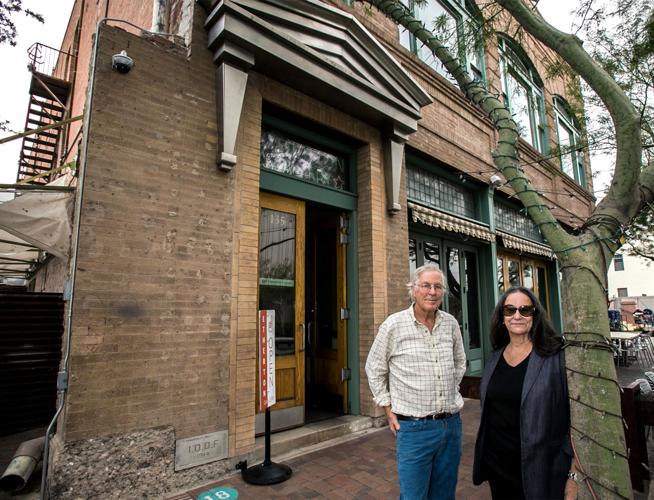Pima County Assessor Bill Staples talks as if he’s defending the little guys, you and me, from paying more property tax than we should.
This year, Staples has taken the apparently unprecedented step of suing 30 owners of commercial property — after those owners won appeals of their properties’ value at the State Board of Equalization.
“My job is to make sure that the full cash value or market value of the property is correct,” Staples said last week. The idea, he said, is that “Everybody pays their fair share of the property tax levy.”
The principle sounds solid, especially if you’re talking about ensuring that a major business, a Raytheon or an Asarco, can’t use its deep pockets to avoid paying its fair share of taxes. But what if that’s not who Staples is really suing?
“Odd Hall LLC” may sound like a faceless business with a strange name. It is actually the vehicle by which artists Barbara Grygutis and Tim Fuller have owned the building at 135 S. Sixth Ave. for the last three decades. They both keep their studios there, in the old Odd Fellows Hall, and they rent out large spaces to a restaurant, Downtown Kitchen + Cocktails, and to the Etherton art gallery.
For 2017, Staples’ office set the full cash value of the property at $616,669, which produced a tax bill of $19,178. For tax year 2018, Staples’ office set the property’s value at an astonishing $972,644, a 58 percent increase. That value wouldn’t mean a proportional surge in taxes right away, because state law sets the maximum property tax increase at 5 percent per year.
But over the long run, a market value like that could drive Fuller and Grygutis out of their own building. They’d need to rent out the space they occupy to someone else to afford the tax payment.
“Tim and I bought this 30 years ago so we could have studio space,” said Grygutis, a well-known local sculptor. “What this does is it pushes people like me out.”
What really boggles the mind is that Grygutis and Fuller, as Odd Hall LLC, followed the proper procedure to contest the new, nearly million-dollar valuation reached by the Assessor’s Office. When they received the notice, they appealed to the Assessor’s Office. The assessor turned down the appeal.
Then they hired a tax agent who did a new appraisal, which they presented to the State Board of Equalization. That cost them $3,000, but it was worth it — they won. The Board of Equalization found that there should be no change at all in the full cash value of the property.
But then, on Oct. 24, Staples went after them. He filed suit against Odd Hall LLC — that is, against Grygutis and Fuller — saying the board had not used the correct standard for determining the property’s value. In essence he was forcing them into court because he thinks they should owe more tax.
The suit, filed by the Pima County Attorney’s Office, says: “The full cash value of the Property for tax year 2018 as determined by the SBOE is insufficient, incorrect, or improper in that it was not determined in accordance with applicable statutory procedures, standard appraisal methods and techniques, Arizona Department of Revenue guidelines, or in accordance with Arizona law.”
The suit also asks for a judge to award Staples’ office the costs of the appeal.
This used to be very unusual. My colleague Murphy Woodhouse, who broke the news of these suits, was able to document that nothing like it has been done since the early 1990s if not before in Pima County. Maricopa County Assessor Paul Petersen said he has filed no lawsuits attempting to overturn the results of a State Board of Equalization case this year. None.
Petersen told Woodhouse he only ever files such suits if it appears the board has usurped its authority or applied a faulty standard that will affect more than one property.
But Staples, a Democrat in his fourth term as assessor, told me the suits aren’t such a big burden to the defendants. As part of each lawsuit, his office will hire an independent appraiser on its own dime and accept whatever results that appraiser finds, he said.
“We will settle the case at that appraised value, so that the property owner doesn’t need to appear in court or get an appraisal,” he said.
But, from the property owner’s perspective, it’s not that simple. At minimum, the property owner has to produce documentation for the county’s appraisal, and if the property owner doesn’t like that appraisal’s result, they’re on their own again.
The assessor served its suit on another faceless business entity, Woodward Family LLC, the day after Thanksgiving. The face who received the suit belonged to Leon Woodward. He is really in no condition for such news.
Woodward, who lives in the Phoenix area and owns a parking lot in downtown Tucson, is suffering from terminal cancer. He sounded bad when I spoke with him, but the more he talked, the angrier he got.
The full cash value that the Assessor’s Office determined for the three properties that make up his lot was $910,202. The State Board of Equalization put their value at $703,368, about 23 percent less.
“The board of equalization, they’re the referee,” Woodward said. “The two players in this game of taxation are me and the county. I won. The county didn’t like it, so they sued.”
“All I’m trying to do is settle my estate for my children and divide my property for my two daughters,” he added. “I’m just a private businessman who’s trying to take care of my family while I’m on my deathbed. But they’re saying, ‘You can’t die yet, you owe us money.’ “
The situation is not as dramatic for Grygutis and Fuller, but it is no less flabbergasting to comprehend the assessor’s aggressive approach.
“It’s simple for them. It doesn’t cost them anything,” Grygutis said. For her and Fuller, she said, “A lawsuit is a whole ’nother ballgame. We can’t defend ourselves unless we spend $5,000 to $7,000.”
“The question for me is, why go to the Board of Equalization if I’m going to get sued and they’ll throw it out?”
Fuller, her partner in owning the building, said, “We don’t have people on staff or deep pockets. We have to hire everybody, and we thought we were at the end of it, but we weren’t.”
Now, most of the properties Staples is suing over are worth more, in the millions. The difference in the valuations between what the assessor and the board found for an HSL apartment complex on North Shannon Road was about $9 million. There are bigger stakes in that case for Pima County’s taxpayers, and HSL, a major commercial property owner, has deeper pockets to defend itself.
But when Staples goes after the little guys — Fuller, Grygutis, Woodward — he’s pursuing differences in valuation that will make no noticeable difference in the property tax you and I owe. By forcing them to spend more time and money to defend themselves beyond the usual end point, and risk having to pay the assessor’s appeals costs, Staples is effectively robbing them of their right to appeal.
At that point, far from defending the little guy, he’s picking on the little guy.





